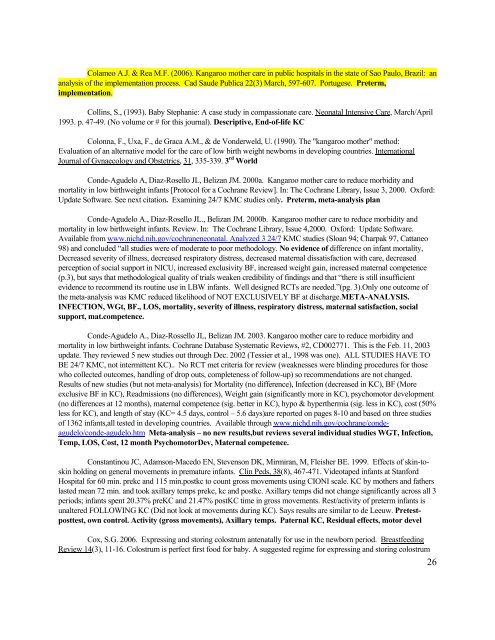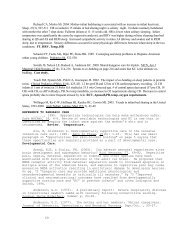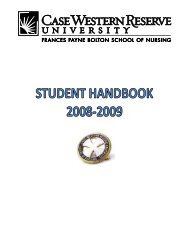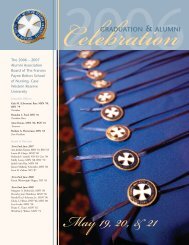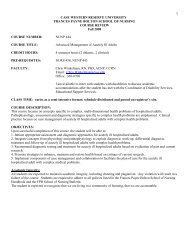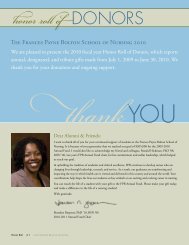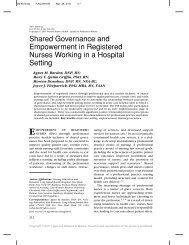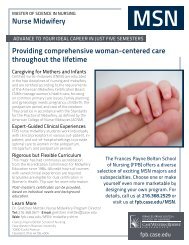Kangaroo Care BIBLIOGRAPHY Develope - Frances Payne Bolton ...
Kangaroo Care BIBLIOGRAPHY Develope - Frances Payne Bolton ...
Kangaroo Care BIBLIOGRAPHY Develope - Frances Payne Bolton ...
You also want an ePaper? Increase the reach of your titles
YUMPU automatically turns print PDFs into web optimized ePapers that Google loves.
Colameo A.J. & Rea M.F. (2006). <strong>Kangaroo</strong> mother care in public hospitals in the state of Sao Paulo, Brazil: an<br />
analysis of the implementation process. Cad Saude Publica 22(3) March, 597-607. Portugese. Preterm,<br />
implementation.<br />
Collins, S., (1993). Baby Stephanie: A case study in compassionate care. Neonatal Intensive <strong>Care</strong>, March/April<br />
1993. p. 47-49. (No volume or # for this journal). Descriptive, End-of-life KC<br />
Colonna, F., Uxa, F., de Graca A.M., & de Vonderweld, U. (1990). The "kangaroo mother" method:<br />
Evaluation of an alternative model for the care of low birth weight newborns in developing countries. International<br />
Journal of Gynaecology and Obstetrics, 31, 335-339. 3 rd World<br />
Conde-Agudelo A, Diaz-Rosello JL, Belizan JM. 2000a. <strong>Kangaroo</strong> mother care to reduce morbidity and<br />
mortality in low birthweight infants [Protocol for a Cochrane Review]. In: The Cochrane Library, Issue 3, 2000. Oxford:<br />
Update Software. See next citation. Examining 24/7 KMC studies only. Preterm, meta-analysis plan<br />
Conde-Agudelo A., Diaz-Rosello JL., Belizan JM. 2000b. <strong>Kangaroo</strong> mother care to reduce morbidity and<br />
mortality in low birthweight infants. Review. In: The Cochrane Library, Issue 4,2000. Oxford: Update Software.<br />
Available from www.nichd.nih.gov/cochraneneonatal. Analyzed 3 24/7 KMC studies (Sloan 94; Charpak 97, Cattaneo<br />
98) and concluded “all studies were of moderate to poor methodology. No evidence of difference on infant mortality,<br />
Decreased severity of illness, decreased respiratory distress, decreased maternal dissatisfaction with care, decreased<br />
perception of social support in NICU, increased exclusivity BF, increased weight gain, increased maternal competence<br />
(p.3), but says that methodological quality of trials weaken credibility of findings and that “there is still insufficient<br />
evidence to recommend its routine use in LBW infants. Well designed RCTs are needed.”(pg. 3).Only one outcome of<br />
the meta-analysis was KMC reduced likelihood of NOT EXCLUSIVELY BF at discharge.META-ANALYSIS.<br />
INFECTION, WGt, BF., LOS, mortality, severity of illness, respiratory distress, maternal satisfaction, social<br />
support, mat.competence.<br />
Conde-Agudelo A., Diaz-Rossello JL, Belizan JM. 2003. <strong>Kangaroo</strong> mother care to reduce morbidity and<br />
mortality in low birthweight infants. Cochrane Database Systematic Reviews, #2, CD002771. This is the Feb. 11, 2003<br />
update. They reviewed 5 new studies out through Dec. 2002 (Tessier et al., 1998 was one). ALL STUDIES HAVE TO<br />
BE 24/7 KMC, not intermittent KC).. No RCT met criteria for review (weaknesses were blinding procedures for those<br />
who collected outcomes, handling of drop outs, completeness of follow-up) so recommendations are not changed.<br />
Results of new studies (but not meta-analysis) for Mortality (no difference), Infection (decreased in KC), BF (More<br />
exclusive BF in KC), Readmissions (no differences), Weight gain (significantly more in KC), psychomotor development<br />
(no differences at 12 months), maternal competence (sig. better in KC), hypo & hyperthermia (sig. less in KC), cost (50%<br />
less for KC), and length of stay (KC= 4.5 days, control – 5.6 days)are reported on pages 8-10 and based on three studies<br />
of 1362 infants,all tested in developing countries. Available through www.nichd.nih.gov/cochrane/condeagudelo/conde-agudelo.htm<br />
Meta-analysis – no new results,but reviews several individual studies WGT, Infection,<br />
Temp, LOS, Cost, 12 month PsychomotorDev, Maternal competence.<br />
Constantinou JC, Adamson-Macedo EN, Stevenson DK, Mirmiran, M, Fleisher BE. 1999. Effects of skin-toskin<br />
holding on general movements in premature infants. Clin Peds, 38(8), 467-471. Videotaped infants at Stanford<br />
Hospital for 60 min. prekc and 115 min.postkc to count gross movements using CIONI scale. KC by mothers and fathers<br />
lasted mean 72 min. and took axillary temps prekc, kc and postkc. Axillary temps did not change significantly across all 3<br />
periods; infants spent 20.37% preKC and 21.47% postKC time in gross movements. Rest/activity of preterm infants is<br />
unaltered FOLLOWING KC (Did not look at movements during KC). Says results are similar to de Leeuw. Pretestposttest,<br />
own control. Activity (gross movements), Axillary temps. Paternal KC, Residual effects, motor devel<br />
Cox, S.G. 2006. Expressing and storing colostrum antenatally for use in the newborn period. Breastfeeding<br />
Review 14(3), 11-16. Colostrum is perfect first food for baby. A suggested regime for expressing and storing colostrum<br />
26


